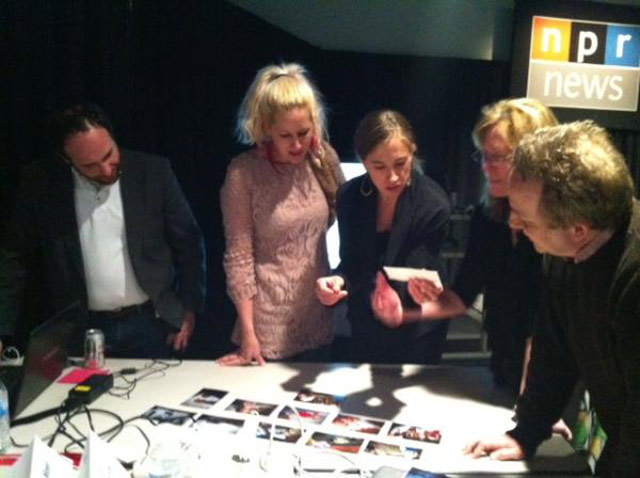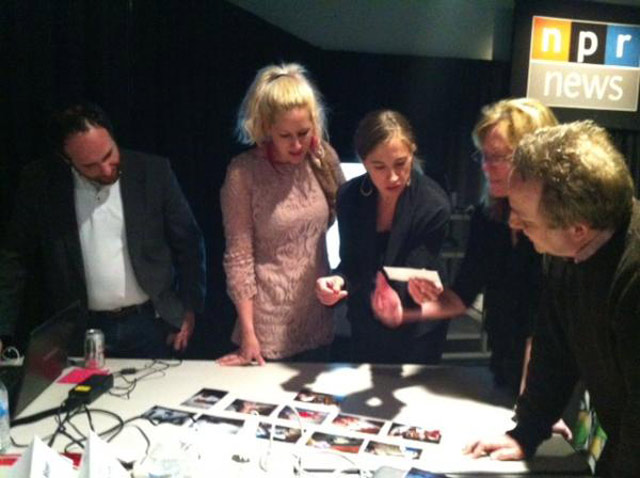
It takes more than a webinar: What NPR learned about building digital skills
Kim Perry is director for NPR editorial coaching and development. NPR’s digital training initiative was made possible by support from Knight Foundation. Photo credit: NPR Digital Services.
Over two years ago, NPR set out to strengthen digital storytelling across public radio member stations; The NPR digital services editorial team built a training initiative to help journalists learn and apply new skills. Ultimately this led to newsrooms integrating digital and broadcast visions. Since then, we’ve collaborated with 827 journalists at 68 member stations in 35 states, along with continued digital coaching for NPR’s journalists.
Stations that successfully integrated digital and broadcast had core things in common. Not all stations moved at the same pace or even had these elements in place at the same time, but the ones that adopted these ideas saw their staff’s digital skills improve, and in turn, the growth and engagement of their digital audiences. In the weeks during and after participating in our 11-week editorial training program, surveyed stations saw a 30 percent increase in average weekly visits to their websites, an almost 68 percent jump in average weekly unique visitors, and a nearly 96 percent increase in the number of average weekly visits driven by social media platforms. The training team that led the effort learned much along the way. Here are a few of those lessons:
Senior management needs to lead the change

Leadership from senior management is essential to creating and sustaining momentum for digital integration. Without clear direction and support, newsrooms flail – often caught in the weeds of existing workflow and mindsets. The most effective leadership constantly reinforced the need to think differently on every story; they encouraged reporters to learn and share; and they celebrated even the smallest successes.
The power of one digital person
Time and again, one of the most tangible changes we’ve seen at stations is hiring a staff member dedicated to digital news. Typically in the role of digital editor, this journalist champions digital integration, digital storytelling and digital audience awareness, and in so doing, begins to change the culture of the newsroom. Understanding the importance of this role, several newsrooms reallocated existing resources to create this position.
Quality over quantity
The typical trajectory for stations when it comes to producing digital content is to first create Web versions of all radio stories – webify the radio script. This is useful for increasing the amount of Web copy, but it doesn’t distinguish the needs of digital and radio audiences. As newsrooms become more adept at creating digital stories, they begin to discern what is working and what is not. This allows them to be more deliberate in their coverage, focusing on unique content and typically fewer digital stories that drive more traffic. They also become more selective and choose not to “webify” stories that will not resonate with digital audiences.
Training in the course of daily work
Throughout our training sessions at both NPR and at member stations, we learned that the most effective form of training for staff was real-time feedback during a reporter’s daily work. When our team was embedded in daily work, they could facilitate learning on the spot. Be it additional training in photography or brainstorming companion digital and radio pieces, this just-in-time coaching didn’t necessarily look like training. This was most effective when participants saw trainers as a member of their team.
It was clear by the end of the two-year grant that the Knight initiative had a significant impact on public media. We invited training participants to share their thanks on Twitter using #NPRKnight. Stations from across the country sent tweets and shared links to their work:
• Rick Holter @rickholter [KERA; Dallas]
Thanks, @knightfdn – you’ve provided the fuel for a digital revolution in public radio. We appreciate it! #NPRKNIGHT
• Mark Brush @markbrush [Michigan Public Radio, Ann Arbor]
Thanks @knightfdn for all the digital training through @NPR! This kind of training is crucial to our continued success! #NPRKnight.
• Jim Hill @ejimbo_com [KUNC; Greeley, Colorado]
“One day we’ll be there.” – A much larger station to me, talking about @KUNC’s digital work. We got there thanks to #NPRKnight & @knightfdn.
We’re hugely proud of the success member stations have seen. While we were there to help initiate the conversation and direct stations to best practices, ultimately, leadership and newsrooms must champion the role of digital in the station’s vision. This is work that must be owned and accomplished from within stations to be successful.
The NPR coaching and development team, Eric Athas, Ki-Min Sung, Teresa Gorman and Kasia Podbielski, contributed to this post.)
Recent Content
-
Journalismarticle ·
-
Journalismarticle ·
-
Journalismarticle ·


